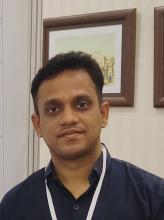- Singh, R., Ehlert, D., Rönnfeldt, L., Bläsing, K., Birke, V. (2025). Accelerated Mechanochemical Remediation of PFAS-Contaminated Soil: A Breakthrough in Non-Combustible Treatment. 19th International Conference on Chemistry and the Environment – ICCE, Belgrade, Serbia, June 2025.
- Singh, R., Ehlert, D., Imai, T., Suzuki, K., Birke, V. (2025). Innovative Reductive Nano Composite Materials for Global Environmental Remediation. 19th International Conference on Chemistry and the Environment – ICCE, Belgrade, Serbia, June 2025.
- Singh, R., Vigelahn, L., Vogel., C., Roesch, P., Simon, F-G, Egloffstein, T., Birke, V. (2024). Rapid and virtually complete mechanochemical reductive defluorination of per- and polyfluoroalkyl substances (PFAS) in contaminated soil using sodium and amines as co-milling agents: A promising first approach for the development of novel non-combustion PFAS remediation processes for soils. International CleanUp Conference, CRC Care Adelaide, Australia, 15 – 19 September 2024.
- Singh, R., Imai, T., Maegaki, M., Suzuki, K., Birke, V. (2024). Advancements in reductive nano materials for remediation of diverse emerging and priority pollutants: Efficacy of reactive materials developed by Nakamurakiso Co., Ltd., Hiroshima, Japan. International CleanUp Conference, CRC Care Adelaide, Australia, 15 – 19 September 2024.
- Birke, V., Singh, R., Prang, O., Vigelahn L., Bläsing K. (2023). Synergistic Removal of Pharmaceuticals and Emerging Contaminants from Aqueous Solutions: an Investigation of Bi-Metal Catalysts, Magnesium, and Green Hydrogen as Efficient Degradation Agents. 18th International Conference on Chemistry and the Environment – ICCE, Venice, Italy, June 2023.
- Guleria, A., Singh, R., Chakma, S., & Birke, V. (2022). Ecological and Human Health Risk Assessment of Soil in and around Chromite Ore Processing Residue (COPR) dumpsites in Kanpur, India. AGU22 Fall Meeting, New Orleans, LA USA. American Geophysical Union, December 2022.
- Birke V., Prang, O., Singh, R. (2022). Degradation of Pharmaceuticals and Other Emerging Pollutants Employing Bi-Metal Catalysts in Aqueous Solution. International CleanUp Conference, CRC Care Adelaide, Australia, 11-15 September 2022.
- Birke V., Singh, R., Vieghlan, L., Bläsing, K., Imai, T., Toda, T., Suzuki, K. (2022). Efficacy of Modified Reductive Nano Iron Powders (RNIPs) for PFAS And Cr(VI) Reduction from Aqueous Solution. International CleanUp Conference, CRC Care Adelaide, Australia, 11-15 Sept 2022.
- Singh, R., Mittal, A., Chakma, S., Birke, V. (2021). Three-Dimensional Numerical Modelling for Simultaneous Removal of Multi Contaminants from Permeable Reactive Barrier (PRB): A Long-Term In-situ Aquifer Remediation Study. AGU21 Fall Meeting, New Orleans, LA USA. American Geophysical Union, 13-17 December.
- Singh, R., Chakma, S., Birke, V. (2021). Performance Evaluation of Three Different Design Configurations of Permeable Reactive Barrier Model for In-situ Groundwater Remediation. 18th Annual Meeting, AOGS 2021 Virtual, Proceedings from conference held 01-06 August 2021.
- Singh, R., Chakma, S., Birke, V. (2019). Simulation study for the application of permeable reactive barrier for aquifer remediation in the proximity of Indian landfill site. 21st EGU General Assembly, EGU 2019, Proceedings from the conference held 7-12 April 2019 in Vienna, Austria.
- Birke V., Singh, R., Chakma, S., Vieghlan L., Schutt C., Burmeier, H. (2019). Assessment and selection of various technical grades zero valent irons (ZVIs) for remediation of chlorinated ethenes for validating efficacy of the Rheine site permeable reactive barrier (PRB), Germany. International CleanUp Conference, CRC Care Adelaide, Australia, 8-12 September 2019.
- Singh, R., Chakma, S. (2018). Groundwater remediation solution by multi-permeable reactive barriers. 50th convention of Indian Water Works Association (IWWA) 2018, Proceedings from the conference, 20- 21 February 2018 in Panaji, Goa, India.
- Singh, R., Gehi, I., Chakma, S. (2018). Analysis of permeable reactive barrier modelling: a sustainable passive technology for in-situ groundwater remediation. Industry-academics confluence on Industry Day Organized at IIT Delhi, 22nd September 2018.
- Singh, R., Chakma, S. (2017). Contaminated groundwater clean-up using permeable reactive barrier: An overview of sustainable technology for remediation in developing countries. International Conference on Modeling of Environmental and Water Resources System. ISBN: 987-93-85926-53-2.
- Singh, R., Singh, R.M., Rawal, N.R. (2017). Contaminant flow and transport in alluvial aquifer system. International Conference on Modeling of Environmental and Water Resources System. ISBN: 987-93-85926-53-2.
- Singh, R., Chakma, S. (2017). Permeable reactive barrier analysis for in-situ groundwater remediation. Industry-academics confluence on Industry Day, IIT Delhi, 23rd Sept 2017.
|
